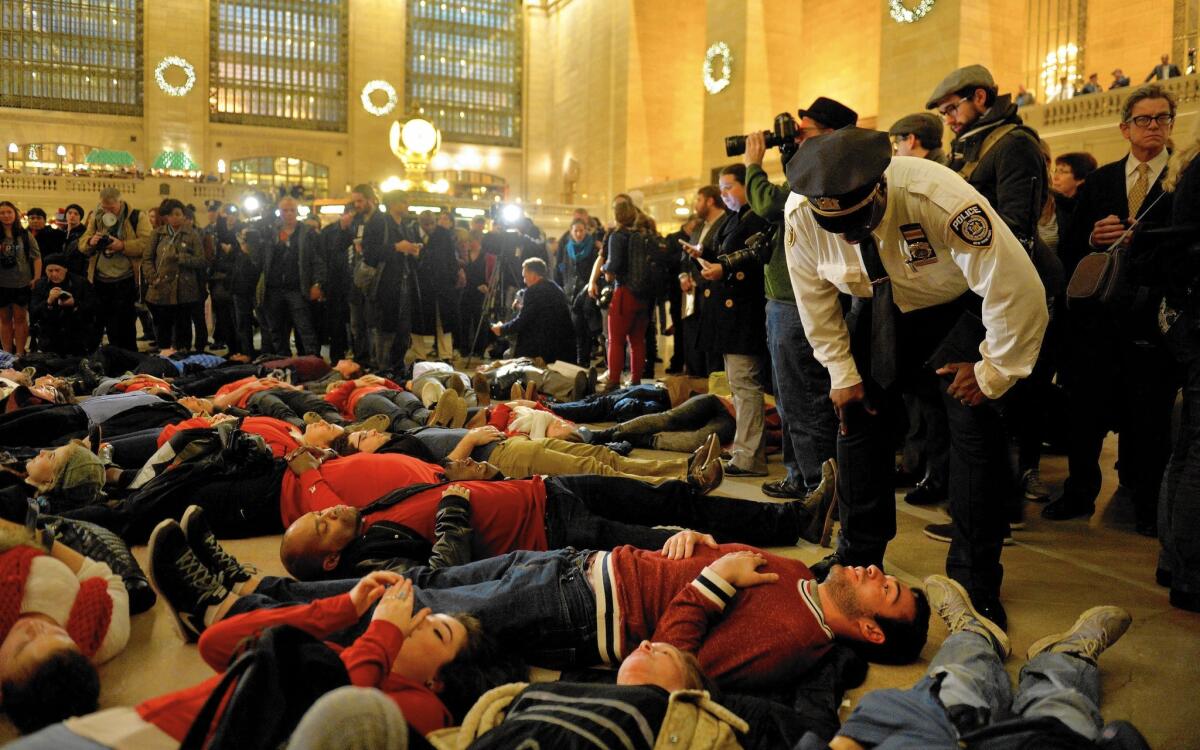Readers React: Justice for all -- but what about Eric Garner?

- Share via
To the editor: My first question in the case of Eric Garner, who died after being placed in a chokehold by New York police Officer Daniel Pantaleo, is why are we identifying the deceased by his ethnicity? Does it matter? I don’t know. (“New York grand jury decides not to indict police officer in chokehold death,” Dec. 3)
There’s a lot of emotion after a New York grand jury declined to indict Pantaleo, that much is clear. It’s powerful and it’s dangerous. There’s a painful history as well, one that goes back to the arrival of the first slave ships from Africa. Yes, I truly believe that is the case. I believe what we are experiencing and feeling today has its roots in the way African Americans have been treated in this country for centuries.
I don’t think those age-old grievances have ever been resolved — not by the Emancipation Proclamation, not by the Civil Rights Act, not by anything that has been said or done to this day. Those grievances will be resolved the day that we (the whole lot of us) genuinely stop fearing and hating each other. I pray for the arrival of that day.
Arthur G. Saginian, Santa Clarita
..
To the editor: At what point do common sense and moral outrage trump the bewildering and possibly biased decisions of grand juries?
In Garner’s death, ruled by the coroner as a homicide, there is the marked absence of ambiguity that one could argue obfuscated the Michael Brown case. There is a video — cold, objective and horrifying to observe.
An unarmed black man, possibly selling “loose cigarettes” (which would ordinarily warrant a citation), is surrounded by police who believe he is resisting arrest. He is quickly wrestled to the ground, rolled onto his stomach and placed in a chokehold, which had been banned in New York. We hear his pitiful cries that he cannot breath.
Although overpowered, no adjustments are made on his restraint. Within moments he lies still and lifeless. No effort is made to resuscitate him.
At no time, before or after the confrontation, was there evidence that he was armed or represented a threat to law enforcement or the community. He was the father of six.
We are taught that justice is blind, allowing her to judge without vision that is jaundiced. Tragically, when grand juries are similarly afflicted, the result can be another unnecessary death committed with impunity.
Ron Terranova, Huntington Beach
..
To the editor: “With liberty and justice for all” — or just for some?
Yes, our Pledge of Allegiance challenges us to have high principles, including always trying to do what is fair, right, true and accurate — the very essence of what we consider to be “just.” We call the members of the Supreme Court “justices” and realize that any decisions in our courts based on greed, bias, politics or the like are blatantly “unjust.”
Unfortunately, the word “just” also has another meaning. It can be used as a put down, as in, “Oh, she’s just a woman.” It can make someone else seem less than worthy of anyone’s care or consideration or of justice.
In other words, as much as we pride ourselves on our love for democracy and for equality under the law, are we really being just to people when we put them down as just a “black man,” “homeless bum” or any such classification? Trayvon Martin, Michael Brown, Eric Garner and far too many others would say no, but their voices have been silenced effectively in the name of justice.
We shouldn’t let our voices be silenced as well. Let’s fight prejudices, cliques, biases, bureaucracy, politics and outright lies to make and keep our beloved nation truly a place dedicated to “liberty and justice for all.”
Bonnie Compton Hanson, Santa Ana
Follow the Opinion section on Twitter @latimesopinion
More to Read
A cure for the common opinion
Get thought-provoking perspectives with our weekly newsletter.
You may occasionally receive promotional content from the Los Angeles Times.






